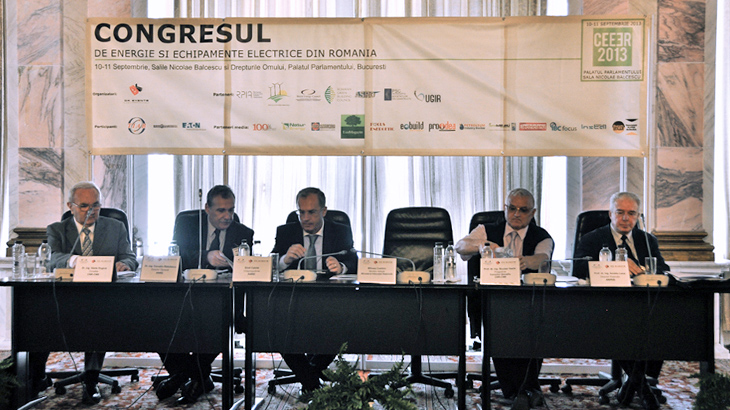[one_half]Energy efficiency is one of the great failures of the Romanian industry in recent years. Only a a handful og big companies have managed to adopt and meet the latest standards. Overall, Romania remains one of Europe’s economies with the highest consumption of energy per unit of GDP.
Experts put this failure on the state account, whose lack of will and power unacceptable and dangerously delays the management of this complexi concept by mean of institutions, legislation, programs and tools. Prof. em. Ph.D. Aureliu Leca is the President of the Romanian Association for the Promotion of Energy Efficiency (ARPEE). At a conference organized by CNR-CME and DK Events, he presented the checklist of the necessary conditions in order to have a sustainable policy for energy efficiency. Of the 37 preconditions identified by the World Bank in 2010, Romania may check now not more than 13, and not the most influential ones.
Cristiana Ion – Adviser to the Director General of the ISPE SA – pointed at the lack of determination from the central authorities.
Who coordinates the energy efficiency programmes?
Who manages the financing?
Who monitors targets?
Who reports and takes responsability?
There are four unanswered questions, with few months before the deadlines imposed by European directives and accepted by Romania.
Cristiana Ion identified no less than 11 categories of sources from European programmes for funding the energy efficiency projects. Only a few of these are used by companies and institutions in Romania.
However, the energy efficiency is the most accessible, the cleanest and the cheapest resource of energy. In addition, the potential impact on economic competitiveness and contribution to sustainable development and energy security are obvious. Although seemingly handy, the energy efficiency is still far away from everyday reality. With a few notable exceptions.
Prof. Ion Mircea, University of Craiova, presented some solutions to streamline the transport systems of high capacity tape already applied to some lignite quarries in Oltenia.
Prof. Radu Pentiuc, University “Stefan cel Mare ” Suceava, spoke about energy audits and energy management [/one_half][one_half_last]applied to a concrete industrial consumer: Cacica salt mine of National Salt Society SALROM.
Vlad Bodea, Business Development Director at Adrem Invest presented the energy management Energy Hub package, which municipalities can use to monitor and optimize their energy flows in relation to their providers and citizens, to step towards the concept of smart city.
Assistance was large and it also came with contributions of good merits. Virgil Musatescu – Coordinator of Programs in CNR-CME (Energy, Environment and Sustainable Development Policies) stressed that energy efficiency projects should insist on full benefits involved – such as including the internalisation of all present costs – so that these projects become more attractive to donors. In turn, Prof. Nicolae Golovanov suggested the companies in electricity sector should build and implement a joint strategy to promote electricity-based technology, adapting the model tested in the last decades by the manufacturers and suppliers of natural gas. Such a move might prove successful, as on the short term the gas prices will increase due to the withdrawal of ANRE reglemented tariffs, and on the long-term, the fossil resources will become even less accessible when easy to use deposits will become exhausted.
###details###[/one_half_last]
